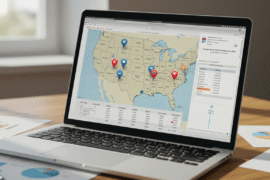This article may contain references to products or services from one or more of our advertisers or partners. We may receive compensation when you click on links to those products or services. Nonetheless, our opinions are our own.
The information presented in this article is accurate to the best of our knowledge at the time of publication. However, information is subject to change, and no guarantees are made about the continued accuracy or completeness of this content after its publication date.
- A Certificate of Liability Insurance
- Introduction
- Certificate of Liability Insurance for Business Protection
- What Is a Certificate of Liability Insurance
- Why Every Business Needs a Certificate of Liability Insurance
- Preparing for Certificate of Liability Insurance
- Essential Documents and Information You Will Need
- How to Assess Your Business Insurance Needs
- Acquiring a Certificate of Liability Insurance
- Maximizing Benefits From Liability Insurance
- Risk Management Practices to Lower Premiums
- Summary of Liability Insurance for Business
- Frequently Asked Questions
- Recommended Reads
A Certificate of Liability Insurance
A certificate of liability insurance shows that your business has general liability coverage, keeping you safe from financial risks. This coverage is essential for many business operations, including working with customers, doing jobs on-site, and offering products or services. It shields your business from claims related to property damage, bodily injury, personal injury, advertising injury, and legal defense costs.
To obtain this certificate, you need to work with a reliable insurance provider. Look for a policy that meets your needs and offers sufficient coverage. It’s smart to review and update your policy regularly to ensure it aligns with your business operations and any changes in risks.
Introduction
Protecting your company from risks is a smart move in business. General liability insurance helps keep your business safe by offering financial protection against many types of claims. This insurance policy is not just a legal requirement but also a smart way to support your business’s long-term growth.
Certificate of Liability Insurance for Business Protection
Running a business comes with risks that can lead to unexpected costs, which is why having a certificate of liability insurance is important. This certificate acts as a safety net, proving that you have liability coverage and helping to build trust with your clients and partners. It demonstrates your commitment to managing risks and handling your finances responsibly.
This certificate includes key information about your insurance policy, such as the types of coverage, policy limits, and the starting and ending dates of the policy. By having this document, your clients and partners can be confident that you are ready to address any potential issues that might arise.
What Is a Certificate of Liability Insurance
A certificate of liability insurance is an important document that shows what liability coverage your business has. It includes details about the types of coverage you’re insured for, such as property damage, bodily injury, and personal or advertising injury. These protections are vital in safeguarding your business from financial strain.
The certificate is more than just paperwork; it’s a sign that you are serious about being responsible and managing risks. It also helps build trust with clients and partners, reassuring them that you can handle potential surprises that may lead to liability claims.
Why Every Business Needs a Certificate of Liability Insurance
Liability insurance is important for every business owner. It protects you from unexpected events and provides financial support in the event of lawsuits. For example, if a customer is injured in your store, the costs can be significant. Without liability insurance, your business would be responsible for medical expenses, legal fees, and any settlements.
These costs can be especially burdensome for small businesses with limited budgets. A certificate of liability insurance demonstrates that you prioritize safety and are managing risks well. It can also help create a solid foundation for your business to grow and succeed.
Voted "Best Overall Budgeting App" by Forbes and WSJ
Monarch Money helps you budget, track spending, set goals, and plan your financial future—all in one app.
Get 50% OFF your first year with code MONARCHVIP
Preparing for Certificate of Liability Insurance
To obtain a liability insurance certificate, it’s important to understand both your business and the insurance market. Before speaking to insurance companies, gather important documents such as your business registration, details about your operations, and income records.
Having these documents ready will allow insurers to fully understand your business and the risks it faces. Being prepared makes the application process simpler and helps you find the best coverage for your business.
Essential Documents and Information You Will Need
When applying for general liability insurance, gather the following documents:
- Business registration or permit: This proves that your business is legitimate and in compliance with regulations.
- Business operations details: This includes the services you offer, the number of employees you have, and your annual income. This information helps insurers assess your business and determine appropriate coverage.
- Past insurance policies: These will give insurers insight into your claims history and potential risks.
Providing clear and detailed information ensures that you receive the most suitable coverage at a fair price.
How to Assess Your Business Insurance Needs
Assessing your insurance needs involves evaluating the risks associated with your business activities. For instance, if you have a physical store, commercial property insurance will be important to protect your assets.
Consider the services or products you provide. If your business involves offering professional advice, professional liability insurance could protect you from negligence claims. The goal is to choose coverage that balances financial protection with your business’s budget and risk tolerance.
Acquiring a Certificate of Liability Insurance
Navigating insurance can be overwhelming, especially for new business owners. However, getting a certificate of liability insurance can be straightforward if you follow these steps:
Step 1: Find a Reputable Insurance Provider
Start by researching insurance companies that offer general liability insurance. Check online reviews and ask other business owners for recommendations. It’s important to choose a provider known for good customer service and stability.
Once you’ve shortlisted some providers, request quotes from each one. Compare coverage options, policy limits, and costs. This will help you choose the best general liability insurance for your business and budget.
Keep in mind that the cheapest option might not provide enough coverage, and the most expensive option isn’t necessarily the best. Take your time to evaluate your choices and find a policy that meets your needs.
Step 2: Evaluate Different Liability Insurance Policies
When reviewing liability insurance policies, pay attention to the types of coverage each plan offers. Some policies might include additional coverage for industry-specific risks, such as product liability or professional liability.
Also, compare premiums from different providers. Remember that premiums can vary based on coverage limits, deductibles, and the perceived risk of your business. Don’t hesitate to ask insurance agents any questions about policy details.
Taking time to carefully evaluate your options will help you find a policy that provides solid protection at a reasonable cost.
Step 3: Understand the Terms and Conditions
Before selecting a policy, carefully review the terms and conditions. Understand what is covered and what isn’t. Pay attention to policy limits, deductibles, and how to file claims. If you have questions, contact the insurance provider’s customer service or consult an independent insurance expert.
By understanding the fine print, you’ll avoid surprises when you need to make a claim and ensure your policy offers the protection you need.
Step 4: Complete the Application Process
After selecting a policy, complete the application. You will need to provide details about your business, such as operations, earnings, and claims history. An insurance agent can help guide you through the application process, ensuring that all information is accurate and complete.
If you’re new to business insurance, seeking help from an experienced insurance agent can be invaluable. They can provide advice on customizing your policy to fit your business needs.
Step 5: Review and Confirm Coverage Details
Once you receive your commercial general liability insurance policy documents, review them carefully. Ensure that the policy reflects your selected coverage limits, deductibles, and any additional options you’ve chosen.
Check that your business information is correct, including your business name, address, and coverage details. Reviewing your policy thoroughly helps prevent mistakes and ensures that your coverage is accurate.
Maximizing Benefits From Liability Insurance
Having a certificate of liability insurance is just the first step. To get the most out of it, treat the certificate as an evolving document that should be regularly reviewed and updated as your business grows.
Your general liability insurance coverage is an important part of your business’s protection. Review your policy regularly, at least once a year or after major changes in your business. This will help ensure that your coverage matches your current operations and risks.
As your business expands or changes, your risks may also evolve. If you introduce new products, services, or employees, update your policy to reflect those changes. Regularly reviewing your coverage also helps identify potential opportunities for discounts or better rates.
Effective risk management is helpful for a safe workplace and lower insurance premiums. Proactively managing risks can reduce the likelihood of incidents that lead to claims.
Take simple steps, such as providing safety training to employees and maintaining a safe work environment. When you manage risks effectively, insurers often reward you with lower premiums.
Summary of Liability Insurance for Business
A certificate of liability insurance is helpful for protecting your business from risks. With the right coverage, regular policy reviews, and proactive risk management, you can safeguard your assets and avoid financial pitfalls. Work with a trusted insurance provider to get the right policy and stay engaged in managing your coverage. By doing so, you’ll ensure long-term security for your business.
Frequently Asked Questions
What does a certificate of liability insurance cover?
General liability insurance protects your business from costs associated with property damage or personal injury caused by your business activities. It covers medical payments, legal fees, and settlement costs for third-party claims.
What types of businesses need a certificate of liability insurance?
Most businesses, regardless of size or industry, can benefit from having a certificate of liability insurance. Whether you’re running a retail shop, providing professional services, or working in construction, liability insurance protects you from potential claims. If your business interacts with clients, customers, or the public, having this certificate can help manage risks and build trust.
How much does a certificate of liability insurance cost?
The cost of a certificate of liability insurance varies based on factors such as the size of your business, the industry you’re in, the level of coverage you need, and your claims history. Small businesses with minimal risk might pay as little as a few hundred dollars annually, while larger businesses or those with higher risks may pay more. It’s important to shop around, compare quotes, and choose a policy that offers the best value for the coverage you need.
How do I know if my policy needs updating?
If you’ve experienced changes such as hiring more employees, moving to a new location, or offering new services or products, it’s time to update your policy. Regular annual reviews with your provider can help ensure your coverage keeps up with your evolving business needs.

Reviewed and edited by Albert Fang.
See a typo or want to suggest an edit/revision to the content? Use the contact us form to provide feedback.
At FangWallet, we value editorial integrity and open collaboration in curating quality content for readers to enjoy. Much appreciated for the assist.
Did you like our article and find it insightful? We encourage sharing the article link with family and friends to benefit as well - better yet, sharing on social media. Thank you for the support! 🍉
Article Title: Protecting Your Business with Certificate of Liability Insurance
https://fangwallet.com/2025/08/01/protecting-your-business-with-certificate-of-liability-insurance/The FangWallet Promise
FangWallet is an editorially independent resource - founded on breaking down challenging financial concepts for anyone to understand since 2014. While we adhere to editorial integrity, note that this post may contain references to products from our partners.
The FangWallet promise is always to have your best interest in mind and be transparent and honest about the financial picture.
Become an Insider

Subscribe to get a free daily budget planner printable to help get your money on track!
Make passive money the right way. No spam.
Editorial Disclaimer: The editorial content on this page is not provided by any of the companies mentioned. The opinions expressed here are the author's alone.
The content of this website is for informational purposes only and does not represent investment advice, or an offer or solicitation to buy or sell any security, investment, or product. Investors are encouraged to do their own due diligence, and, if necessary, consult professional advising before making any investment decisions. Investing involves a high degree of risk, and financial losses may occur including the potential loss of principal.
Source Citation References:
+ Inspo
There are no additional citations or references to note for this article at this time.












































